Oil Spill
1. What is an oil spill?
An oil spill is an incident that happens in the extraction, processing, transporting oil and oil products (such as a leakage in the pipeline, marine accidents, oil rig incidents,), causing the leakage of oil into the environment, causing pollution, and negatively affect the ecosystem and the economy. The amount of oil spilled into nature needs to be a few hundred litters and above to be considered an oil spill.
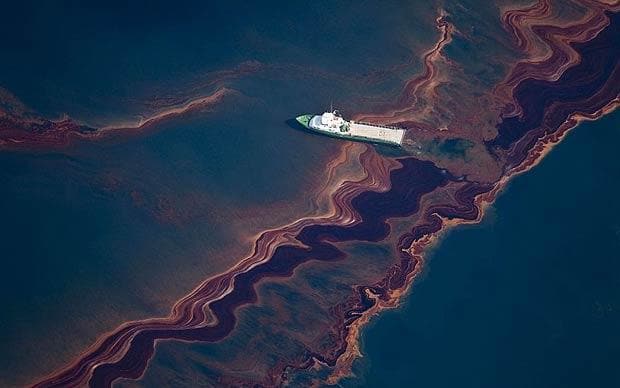
Oil spill on the sea surface. Photo: Reuters
Some main causes of oil spills
Oil container vessels breaking down or getting stranded. When trying to escape from shallow water, these vessels can crash into underwater rocks, corals, and worn holes into, causing a large amount of oil contained in them to escape into the water. While these incidents are most widely publicized, they only make up 2% of oil spills in the sea.
Oil extraction in the ocean. Especially serious oil spills can happen when the oil-stopping mechanism is broken, or the oil rig explodes, Furthermore, fuels used in oil extraction can also leak into the water.
Fuel leakage from vehicles on the sea surface like motorboats, motor surfboard,...
Geological leaks under the sea.
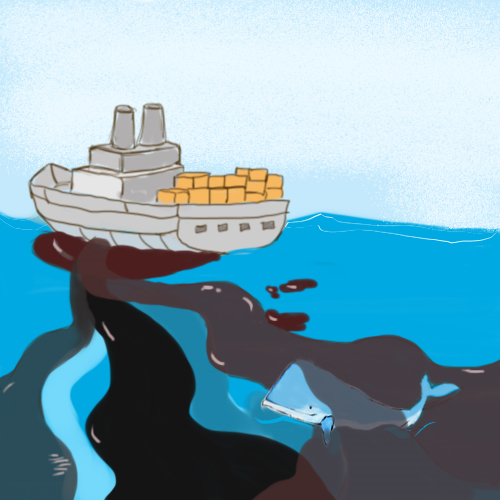
2. The fate of spilled oil
Firstly, the oil will float on the water surface, and then spread widely, mostly on the surface. Waves, winds and currents push the water far and wide, affecting the surface layers of the ocean, the shore, and the living environment of creatures that it passes by.
The oil also partially evaporates and becomes thick and viscous, creating a thick layer. Another part can melt into the water and spreads almost invisibly in the water, or causing a thick bubble cluster. Another part can sink with floating sediments and the remaining clots into tar. After a long period, the waste oil is decomposed by sunlight or microbes.
.jpg)
Oil spills bring a lot of dangers:
- The spilled oil is extremely toxic to the majority of creatures. Concentrated spilled oil can immediately kill or poison a great number of fish. However, the lasting impact of spilled oil on the ecosystem is even more serious and long-lasting. Oil pollutes organic matters in the seawater, taking away the food source, and eventually halting the reproduction and livelihood of marine creatures.
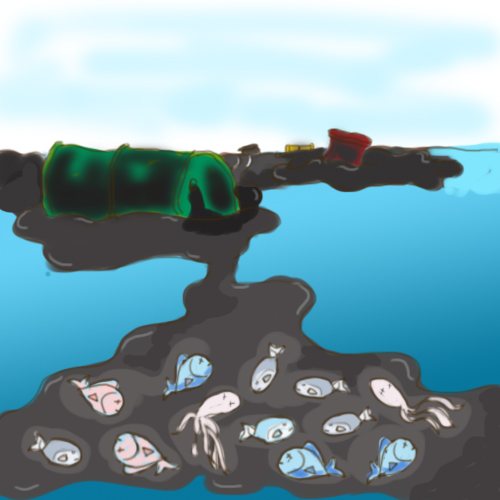
- Spilled oil is also very toxic to mammals, amphibians, reptiles and birds living near or in the ocean. They can be poisoned from contact with or consumption of the oil; get suffocated, have their heat isulating feather/skin and their reproductive systems damaged; and suffer from behavioral changes. They can reduce in population or become extinct.
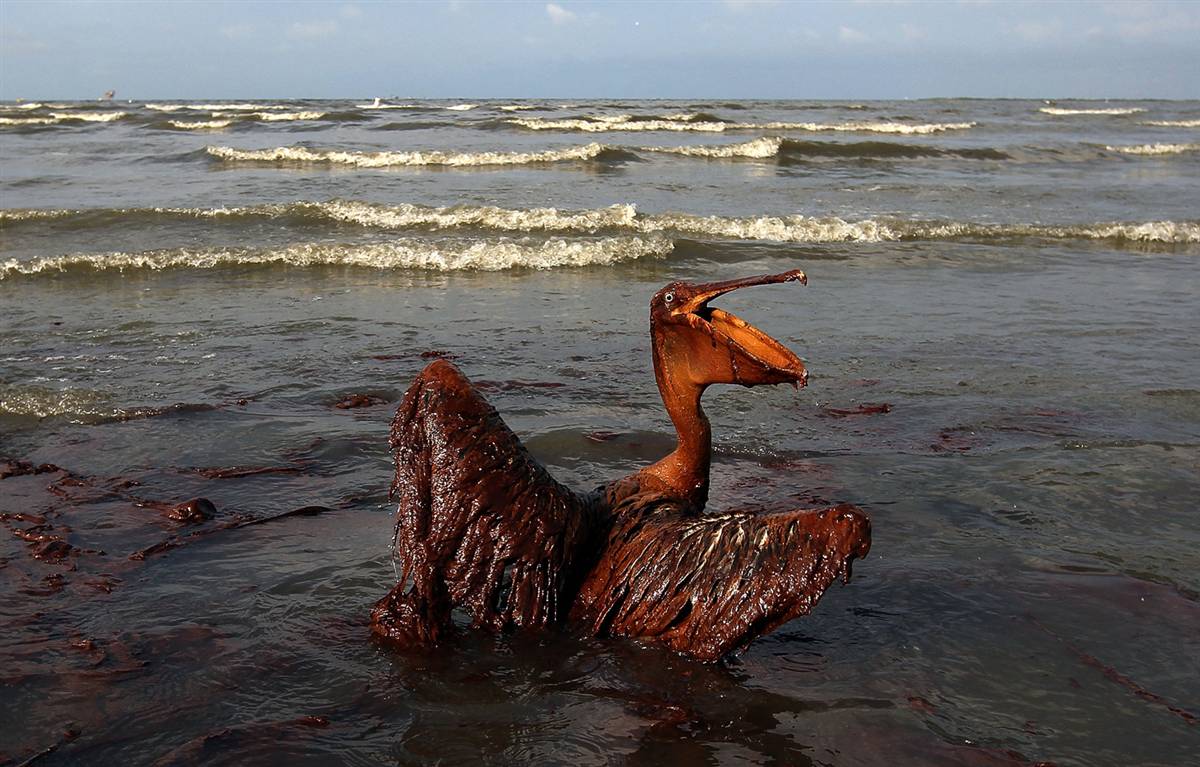
A pelican is caught in oil spills and is calling for help. Photo: Odyssey Online.[1]
- The seaside area is often home to many, and a site of many economic activities such as fishing, sea tourism (diving, swimming, fishing, cruising), along with national parks and reservations, Oil spills leave a very negative and long-lasting effect to the socioeconomic situation of these areas.
3. What is happening?
Over the world, oil spills caused by marine accidents have declined considerably since 1970 due to technological advances, however those caused by breakage and leakage in pipelines have shown a trend in the reversed direction. The number of such incidents has risen from an average of 47 per year from 1968 to 1977, to 188 and 288 in the following decades.[2] In America, this figure has quadrupled since 1990.[3]
The largest intentional oil spill ever recorded was at the Persian Gulf during the Gulf War of 1991. Over 7 million tons of oil was spilled into the sea near Kuwait and Saudi Arabia, when some oil vessels and containers were destroyed during the war. The largest unintentional one was the explosion of the Deepwater Horizon oil rig in 2010, in which 6 million tons of oil spilled into the Mexican Gulf.[4]
According to the Ho Chi Minh City Environment and Natural Resources Department, within the last 20 years, Vietnam has about 10 big recognized oil spills every year.[5]
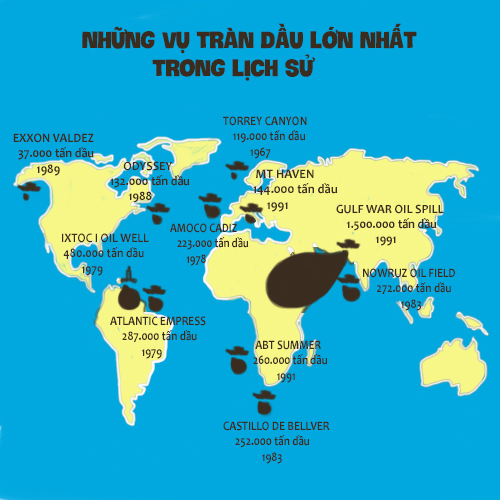
In Vietnam
From July 7 to July 31, 2013, there was an oil spill incident in Quy Nhon that cost more than 2 billion VND. More than 700 fish cages of 80 fishermen in Thi Nai, an area of 14000m square, were affected by permeating oil sticking to fishing and aquacultural tools, causing damages to more than 10000 fish and oysters. In addition, the authority had to spend more than 200 million VND to mitigate the incident [7]
In the bay area of Bai Chay (Ha Long, Quang Ninh), the oil content shows sign of increasing in the period 2011-2015, reaching the level from 0.012mg/L-0.826mg/L, which is higher than the standard of 0.2mg/L [8]. Recently, in August 2017, during the transportation of oil by two ships from Diep Dung transportation Company Limited, the plastic rubber transmission pipeline was punctured, dumping 200 liter of oil to the ocean [9].
4. Let's act
- Should an oil spill happen locally, you should participate in damage control along with specialists within your abilities:
- Stopping and sequestering the spilled oil is the first priority. The sequestration can be done with high technology, or simply with specialized floats designed for the task, or making floats out of bamboo. The next step is to gather the oil in any way possible, from pumping to manually scooping it out of the water; hay or other spongy materials can also be used to absorb oil. The last step is to remove these materials from the water and keep them in a safe place.
- In the case of an oil spill far from land, consider using an oil disperser to prevent it from floating into the shore and polluting an area that often houses many marine creatures, seaside marine reservations, and mangrove forests that are prioritized in protection.
- When the oil has spread into the shore, quick actions are needed. All vehicles, from crude (such as shovels, buckets…) to modern (such as tanks, oil pumps, trucks…), need to participate in gathering oil and oil residue.
- Oil, oil residue, and oil-absorbing materials such as soil, sand, tree branches, oil-stained litter, etc) need to be gathered in one place and prevented from leaking into the environment before you receive directions on how to process them from authorized personnel.
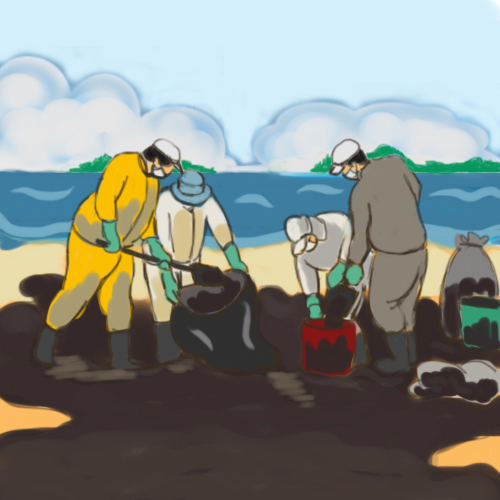
Since oil and oil products are potentially dangerous, the prevention of oil spills is vital. When we use little oil, the amount transported will reduce, which means the risk of oil spills will also decline. Simple actions we can take include:
- Reduce the excessive use of oil products. Bike, walk, or use public transportation instead of travelling by motorbike or car.
- Convince your friends and families to follow your examples. Help others around you understand that our over-dependence on oil products causes oil spills, and thus will eventually destroy the ocean. Each of us can contribute to help solve this crisis.[6]



